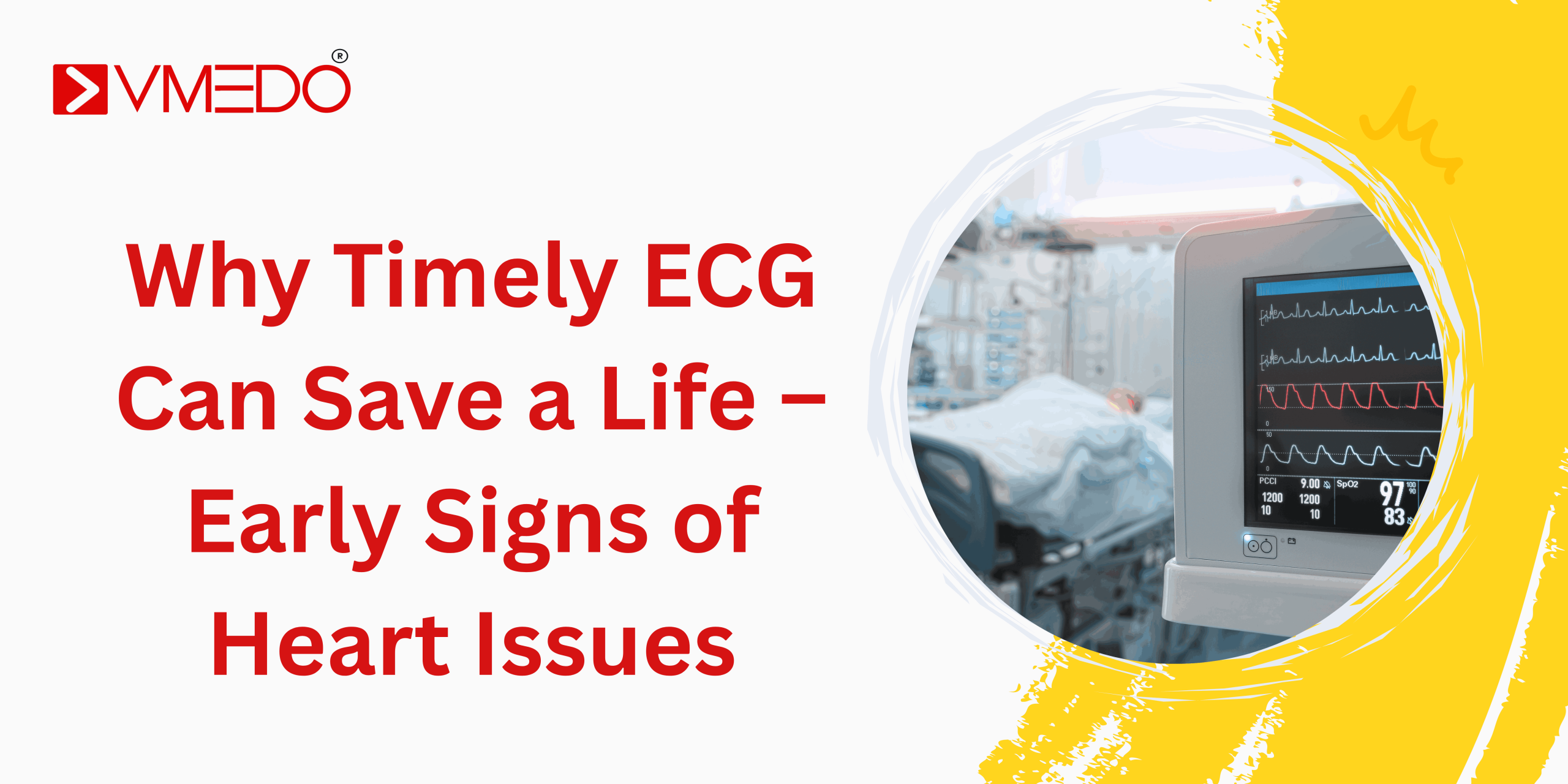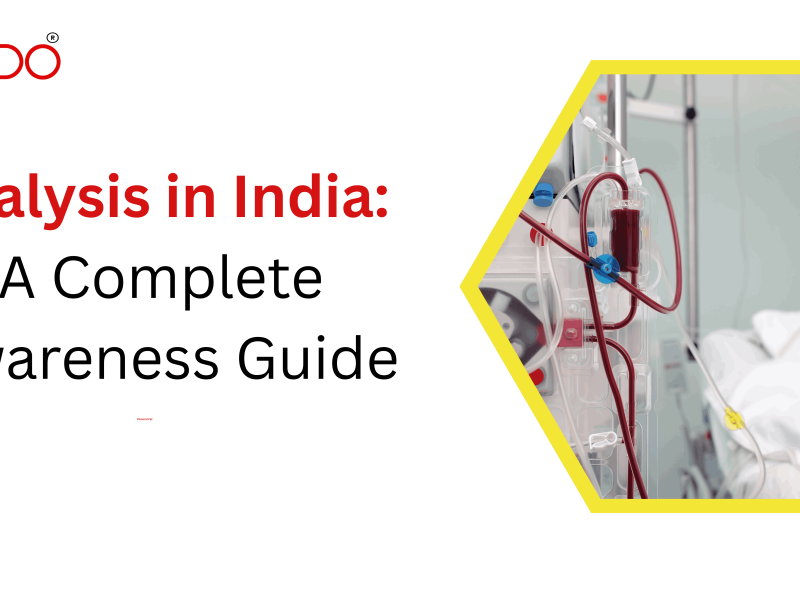When it comes to heart disease, most people imagine dramatic symptoms like sharp chest pain or sudden collapse. In reality, life-threatening heart issues often begin with subtle signals that are easy to ignore—or worse, go completely unnoticed. That’s why timely ECG screening plays such a critical, life-saving role. An Electrocardiogram is a simple, painless test that can uncover silent abnormalities in the heart’s electrical activity long before they turn into a medical emergency. Early detection through ECG not only gives doctors more time to intervene but also dramatically improves outcomes for patients by preventing heart attacks, cardiac arrests and other serious events. In a world where our lifestyles are increasingly stressful and sedentary, understanding the importance of a timely ECG—and acting on it—can truly make the difference between life and death.
What is an ECG?
An Electrocardiogram (ECG) is a medical test that records the electrical activity of the heart over a period of time using electrodes placed on the skin. It measures:
-
Heart rate
-
Heart rhythm
-
Electrical conduction within the heart
A typical ECG takes just a few minutes and is completely painless. Because the heart generates electrical impulses as it contracts, these impulses can be detected and recorded in the form of wave patterns on an ECG report. Based on the waveforms, doctors can identify any abnormalities or damage in the heart.
How Does an ECG Work?
The heart has its own electrical system that triggers heartbeats by sending electrical impulses. When electrodes are placed on the chest, arms and legs, they pick up these impulses and transmit them to the ECG machine. The machine then prints out a graph that represents each electrical impulse as a wave.
This graph provides important clues to a cardiologist:
| ECG Wave | What it Represents |
|---|---|
| P Wave | Atrial contraction |
| QRS Complex | Ventricular contraction |
| T Wave | Heart muscle relaxation (repolarisation) |
Any abnormality in size, duration or timing of the waveforms can reveal heart problems, such as arrhythmia or heart block.
Why Timely ECG Matters
Most life-threatening heart conditions don’t arrive suddenly; they start with minor abnormalities that can be detected well in advance. That’s where a timely ECG becomes invaluable.
1. Early Detection of Arrhythmias
Irregular heartbeats can cause fainting, strokes or even sudden cardiac arrest. Many arrhythmias are silent and get detected only during routine ECG screening. A timely ECG can help start medications or procedures before complications arise.
2. Identifying Myocardial Infarction (Heart Attack)
An ECG can detect changes in the electrical pattern that occur when heart muscle is damaged. When done at the right time (often immediately when symptoms begin), an ECG can confirm a heart attack and ensure early treatment—preventing further muscle damage.
3. Monitoring Chest Pain
Not all chest pain is due to heart issues, but an ECG helps identify ischemia (restricted blood flow to the heart). This differentiation is essential for choosing correct emergency treatment.
4. Preventing Sudden Cardiac Arrest in High-Risk Individuals
For people with hypertension, diabetes, high cholesterol or a family history of heart disease, a regular ECG helps monitor heart’s electrical health and prevent sudden fatal episodes.
5. Pre-Surgical Evaluation
Before any major surgery, an ECG gives a baseline of cardiac condition. Ignoring this step could lead to intraoperative cardiac complications.
Early Signs and Symptoms That Call for an ECG
Early warning signs are often subtle and unfortunately ignored. If you experience even one of the following symptoms, do not delay an ECG:
-
Shortness of breath without exertion
-
Intermittent chest discomfort (tightness, burning, pressure, heaviness)
-
Unexplained fatigue or weakness
-
Rapid or irregular heartbeat (palpitations)
-
Dizziness or frequent fainting spells
-
Swelling in ankles or feet
-
Sudden sweating and nausea
Note: These symptoms may come and go, or appear only during stress or physical exertion. An ECG can still reveal underlying conditions even if symptoms aren’t present at that exact moment.
Who Should Get Regular ECGs?
You might assume ECGs are only for elderly people or those with diagnosed heart disease. That’s not true. Anyone with any of the following risk factors should get regular ECG screening:
| Risk Factor | Description |
|---|---|
| Hypertension (High BP) | Continuous pressure overload weakens the heart |
| Diabetes | Damages blood vessels, raises heart disease risk |
| High cholesterol | Leads to clogged arteries |
| Smoking and alcohol | Increase stress on heart function |
| Sedentary lifestyle | Lack of exercise weakens cardiovascular system |
| Strong family history | History of heart disease in close relatives |
| Obesity | Forces the heart to work harder |
Even in the absence of symptoms, a baseline ECG after age 40 is recommended for everyone, and earlier for those with the above risk factors.
What Abnormalities Can A Timely ECG Reveal?
An ECG can detect several common and serious conditions, such as:
-
Atrial Fibrillation (AFib) – irregular rapid heart rhythm, high stroke risk
-
Ventricular Tachycardia – fast heart rhythm from lower chambers, may cause sudden death
-
Ischemia – reduced blood flow, often due to blocked arteries
-
Myocardial Infarction – damage due to heart attack
-
Heart Block – electrical conduction is delayed or interrupted
-
Electrolyte Imbalances – low potassium or calcium levels can show up on ECG
The earlier these conditions are found, the more effective and less invasive the treatment can be.
Timely ECG in Emergency Situations – A Real Game Changer
In emergency care, time is muscle—every minute of delay during a heart attack increases the damage to heart muscle. A quick ECG in the ambulance or as soon as a patient reaches the hospital allows doctors to:
-
Decide if clot-busting drugs are required
-
Activate the Cath Lab for emergency angioplasty
-
Start oxygen, medications and stabilization procedures immediately
Studies show that the first 60 minutes (also known as the golden hour) are critical. ECG plays the central role in decision-making during this period.
ECG at Home – Accessible and Life-saving
Advancements in healthcare delivery now allow ECG services at home, which offers several advantages:
-
Immediate response (no travel time)
-
Comfort and reduced anxiety of being at home
-
Faster detection and faster treatment
-
Ideal for senior citizens or bedridden individuals
Some healthcare providers even offer real-time online cardiologist interpretation once the home ECG is done.
Myths About ECGs—Debunked
| Myth | Fact |
|---|---|
| ECGs are only needed if I have pain | ECG detects silent issues even before symptoms begin |
| It’s a complicated test | It takes less than 10 minutes and is painless |
| ECGs are expensive | In comparison to the cost of cardiac treatment, ECG is very affordable |
| ECG will expose me to radiation | ECG only records electrical signals; there is no radiation |
How Often Should You Get An ECG?
The frequency of ECG depends on your age and risk profile. A general guideline is:
| Category | Recommended Frequency |
|---|---|
| Healthy person <40 years | Every 3–5 years |
| Age >40 years | Once a year |
| Diabetes / Hypertension | Once in 6–12 months |
| Cardiac history / previous MI | As advised by cardiologist (often every 3–6 months) |
Steps to Take After an Abnormal ECG
-
Consult a cardiologist immediately
-
Undergo further tests such as Echocardiography, Stress Test, or Angiography if advised
-
Follow medication schedule strictly
-
Adopt lifestyle changes: stop smoking, lose weight, exercise moderately
-
Get follow-up ECGs on scheduled dates to monitor improvement
Ignoring an abnormal ECG is the worst thing one can do. Early treatment can often reverse or control the condition.
Conclusion
Your heart rarely fails without warning — it usually sends out signals well in advance. The problem is that most people don’t listen, either because the symptoms feel “minor” or because they simply don’t know what to look for. A timely ECG bridges that gap. It allows your doctor to read the hidden electrical messages your heart is sending and identify issues at a stage where they are still highly treatable. Whether you are experiencing mild discomfort or you fall into a high-risk category, don’t wait for the symptoms to become serious. A 10-minute test today could save you from a life-threatening emergency tomorrow. Put your heart on your priority list — schedule regular ECGs, stay aware of the warning signs, and never underestimate the power of early detection.



